On the level of the human personality, it is clear we are not all of one mind. Truth is, we’re divided even within ourselves. And this fragmentation is the reason we are here. The mission for each of us is to heal our destructive tendencies and bring ourselves into harmony by becoming whole again. This healing must happen before letting go.
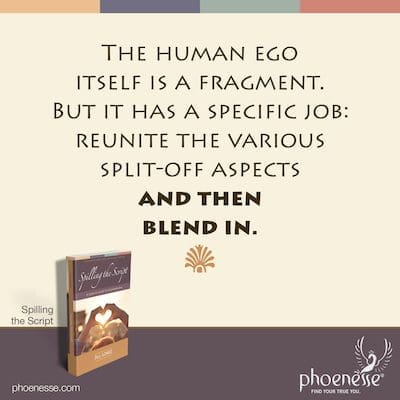
Because as long as we remain fractured and discombobulated, we are in a state of inner chaos and the mobile won’t hang straight. But to have a chance at restoring ourselves to balance, we need a way to keep all our bits from flying apart. Enter the human ego, which acts like strings for our proverbial life-mobile.
The human ego itself is a fragment, an aspect of the whole. But it has a specific job: reunite the various split off aspects and then blend in. In fact, the ego is essentially made up of the same basic energy and consciousness as that substance with which it will ultimately reunite: the real self.
We can equate the real self with the essential nature of life and all of creation. It experiences fully, knows deeply, feels completely and creates beautifully. Everything wise and life-expanding comes from the real, true self. Sounds wonderful. So why don’t we just live from there?
Because our true self has gotten covered over by the distortions of our Lower Self. Getting through the walls and wily ways of the Lower Self requires that we take action using our outer will. This is the part of ourselves we have direct access to. And this is under the control of the human ego. We don’t have direct access to our true self.
To illustrate, we can liken our ego to our hands and feet, and our true self to our heart and blood. We can control the movement of a hand or foot, but not our heartbeat or circulation. To affect our circulation, we can exercise our bodies. But we don’t have direct access to affecting the flow of our blood. In a similar way, we cannot directly change our emotions. But we can determine the direction of our thinking, which ultimately can change undesirable feelings. This is the way we must go.
Unfortunately, we too often attempt to use our outer will, or ego, in ways that don’t work. So we gradually weaken our ego and wear ourselves out. This happens, for example, when we over-think things or worry, believing that this “effort” will affect a situation over which we actually have no direct control. Rather than letting go and letting the true self lead, the ego grasps at straws.
After awhile, the weak, sick ego often wants to give itself up simply because it cannot bear itself any longer. Now the ego will attempt to relax or let go using means that are really just escapes, like drugs and alcohol. More extreme forms of releasing an over-functioning ego are insanity, and less extreme forms include “checking out” and disconnecting from life.
Remember, we’re really only here to reunite our unhinged parts. So what now?
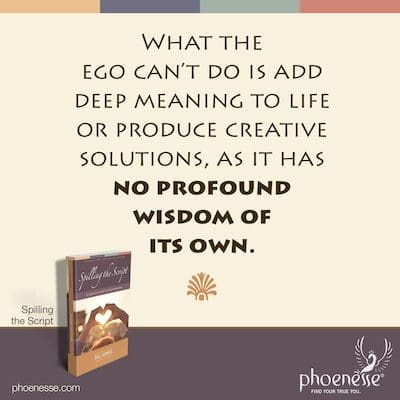
Letting go from a base of strength is the way to achieve that one thing we all deeply long for: happiness. This is also the way to tap our inner intelligence and wisdom, which is by far greater than our directly available ego-mind. To properly let go then, we need to begin with a healthy, balanced ego.
To start, let’s consider some of the roles of the human ego. It is the part of us that thinks, acts, decides, memorizes, learns, repeats, copies, remembers, sorts out, selects, and moves inward or outward. In short, the ego is really good at taking things in, straightening them up and spitting them back out. What the ego can’t do is add deep meaning to life or produce creative solutions, as it has no profound wisdom of its own.
“All really beautiful, valid, constructive, meaningful experience comes from a perfect balance between the volitional ego and the non-volitional self.”
– Pathwork Lecture #142
So how did we get here? If we look around, we can see evidence of creativity in the way life is constantly moving, changing and branching into new territories. This is what leads to individualization. But over time, as we’ve experienced ourselves as ego-based individuals, we’ve drifted further and further from the source at our center and forgotten our essence. Eventually we only associate ourselves with our separate existence—with our ego.
From here, with the ego firmly in the lead, we will fear letting go of the outer ego because we do not want to lose our sense of identity. We feel threatened by this feeling of “I am not,” and we hold on more tightly. Hence the ego must become strong enough to relax to let go of itself; it has to become brave enough to die to its own illusion. This is what needs to happen for us to experience our connection with all that is and to live in the Oneness. Again, this is where we all must go.
For the truth is, we really are one with the creative nature of life, meaning we can surrender to this greater force and allow our ego functions to integrate with it. Then, when we are in touch with our real self—which means we are in unity within ourselves—we will have access to feeling, experiencing and knowing deeply, which is to be creative.
The ego, on the other hand, can’t embrace opposites, meaning it cannot transcend duality and find peace. So then peace without the experience of excitement will feel like boredom, while excitement without peace will mean anxiety. Living primarily from the ego then, as most humans do, makes one feel perpetually bored or anxious.
“Ego means effort; spiritual self means effortlessness. This desirable effortlessness is not given by magic, however, for this would mean that the ego is not being transcended but avoided. The ego must change its lazy, resistant attitudes in order to transcend itself—to become able to unify with the cosmic, greater self.”
– Pathwork Lecture #199
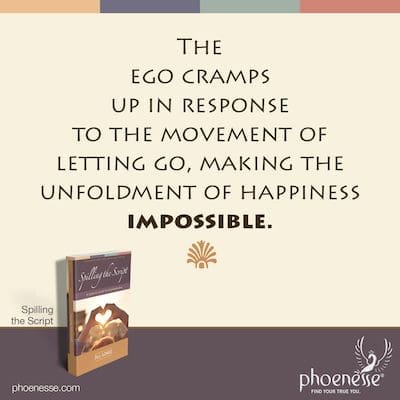
To transcend our ego, we must make an effort to align with our spiritual self where all effort can feel effortless. But such desirable effortlessness is not handed out like candy. The ego must work for it, overcoming its lazy ways and resistant attitudes.
Further, we must come to see that it is possible to experience this universal power in the present moment. We don’t need to wait for a fulfillment that is pushed off—as religions often promote—into life after death. Ironically, the ego would prefer to wait, given the great misunderstanding that giving up the ego means giving up existence. As a result, the ego cramps up in response to the movement of letting go, making the unfoldment of happiness impossible.
Some spiritual teachings say we should dispense with the ego. But nothing could be further from the truth. The ego has a job to do and it needs to get moving. Which is to say, it must wake up, know its position, and establish permanent contact with the greater self. It is also tasked with discovering the obstructions between it and the real self. It needs to take action to open the doors that allow the Higher Self to heal the Lower Self.
“After it has fulfilled its task of deciding for truthfulness, integrity, honesty, effort and good will, it must step aside and allow the real self to come forth with its intuition and inspiration that set the pace and direct the individual path…The ego can be likened to hands and arms that move toward the source of life and stop moving when their function is no longer anything else but to receive.”
– Pathwork Lecture #158
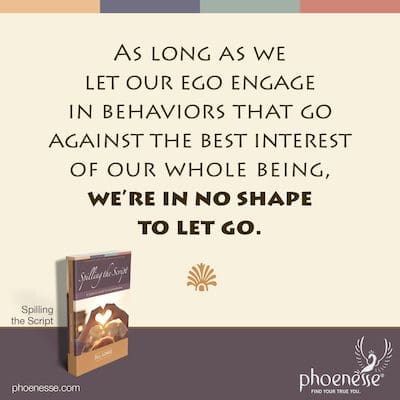
Living life from the ego is exhausting, because the ego cannot replenish itself at the source. If the ego can let go, it can reenergize through sleep, which is a rest from ego chores. But when the ego is overactive, sleep is often fitful. Self-forgetfulness also happens in the state of love for another person, making it possible for the ego to dip into the sea of replenishing power. Another way is through deep meditation, where one surrenders to greater truths. Then new wisdom opens up inner doors and rejuvenates our whole being.
Since there’s so much to gain, why doesn’t the ego just let go? Because it is hazardous to let go as long as the ego is immature and unhealthy. If the ego is nurturing hate, distrust, weakness and a tendency for self-damaging behaviors, it is not compatible with the greater reality which runs on being loving, generous, open, trusting, realistic and self-assertive.
As long as we’re not equipped to take care of ourselves and we let our ego engage in behaviors that go against the best interest of our whole being, we’re in no shape to let go. For our weak unhealthy ego will then become unsupported, totally disorganized and unable to cope with anything. This is why we must give up our destructiveness.
So if we feel unable to let go, somewhere in us is a will to be negative and destructive. The Lower Self is ruling the roost. This destructiveness includes being vindictive, not loving others, and punishing others for our suffering. But no one is forcing us to give anything up against our will. We must be the ones who take the necessary steps to give up destructiveness.
We spend as much as 95% of our time in our ego, unbalanced and with life lacking meaning. The unhealed ego knows it doesn’t have solutions, but it doesn’t yet know another way.
“To the extent these experiences are hindered because of obstruction in the personality which the ego is unwilling to remove, to that extent life dries out and various degrees of death set in. Actual physical death is the natural end result of a process of drying out, of separating the self from the source of all life.”
– Pathwork Lecture #161
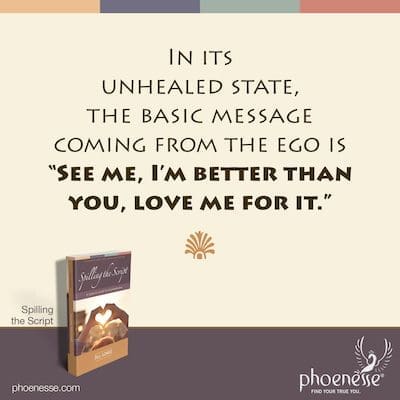
In its unhealed state, the basic message coming from the ego is “See me, I’m better than you, love me for it,” as it acts out the Lower Self qualities of self-will, pride and fear. The ego fears its own death and denies the Higher Self, using its distrust to justify staying separate. The ego must overcome its fear of death, lower its pride, and let go to the greater consciousness.
To avoid this, the ego will use tricks such as inattentiveness, lack of concentration or absent-mindedness to prevent the focusing necessary for the ego to transcend itself. Laziness, tiredness and passivity are other tricks of the ego. They make movement impossible, undesirable and exhausting. The unhealed ego will also allow its own immature emotional reactions to go unchecked, and make more of another’s behavior than necessary.
To transcend itself, the ego must be able to focus. It needs discipline, courage, humility and the ability to commit itself. Our goal is for the ego to become mature and healed, not denied or insulted. We must direct the searchlight of truth onto the little self, recognizing these tricks for what they are. Denial, rationalization and projection must be given up. Only in this way can we adopt healthy, truthful attitudes.
We are in turmoil because we rebel against what is unchangeable: people don’t respond or behave the way we want them to; situations don’t go the way we had hoped. Life isn’t perfect and we won’t surrender to what is. We trust the limited ego instead of letting go and trusting the God that lives within.
Prayer
Use me God.
Show me how to take
Who I am,
What I can do, and
Who I want to be,
And use it for a purpose
Greater than myself.
– Martin Luther King Jr.
Learn more in After the Ego: Insights from the Pathwork® Guide on How to Wake Up.
The Guide teaches in the very first lecture that spiritual laws can be made a living reality on three different levels: doing, thinking and feeling. The easiest to deal with is actions, which is where the ego is most effective. This is the level mankind was mostly operating at when God gave us the Ten Commandments, including “Thou shalt not steal” and “Thou shalt not lie.” That was a lot to take in for the average person at that time.
The next stage deals with our thoughts. All thoughts and feelings have form and substance in the Spirit World. In not understanding this, we think our impure thoughts won’t hurt us. We would be wrong. They do bring about outer effects and chain reactions. But we have to start somewhere, and so we can often “act our way into right thinking,” at least in some areas.
The most difficult task is on the emotional level. This is hard because many feelings are unconscious and we need work, willpower and patience to make them conscious. Further, we can’t control our feelings as immediately and directly as our thoughts or actions. We can force ourselves to walk this path but we can’t will ourselves to love or have the faith that will come as a result of our work on this path.
The ability to surrender is an essential inner movement from which all good can flow. Over time, which may take thousands of years and many lifetimes, the ego will dissolve into the greater consciousness. We need to surrender to the will of God or else we will be shortsighted, in pain and confusion, and in our self-will.
We also need to surrender to others—our teachers, healers and loved ones. Refusal to surrender means lack of trust and a suspicion and misunderstanding that surrender means loss of autonomy and the ability to make future decisions. This creates an over-developed self-will that always brings strife. We need to find the balance between holding firm and surrendering. It is not a contradiction.
- a) Where in our life are we standing in our active, positive aggression?
- b) Where are we able to let go and trust?
- c) Where have we let go into futility and hopelessness?
- d) Where do we defend tightly, refusing to give in?
- e) Where do we lack self-responsibility?
- f) Where are we secretly dependent, yet outwardly defiantly independent?
- g) Where is the hidden corner of ourselves that we withhold?
- h) Where do we genuinely surrender?
- i) Where do we surrender falsely, to please others?
- j) Where do we want to be superior?
- k) Where do we hold back our greatness?
Learn more in Gems, Chapter 4: Claiming our Total Capacity for Greatness, and Chapter 10: Spotting the Tricks of our Ego and Getting Over Ourselves.

It is suggested in feng shui that if we want something new to come into our life, we should clean out our closets. In a similar way, the Guide teaches that our psyches are like a vessel. If they are filled with muddy water and we pour in clear water, the clear water will become muddy too. So we must empty ourselves of the muddy water first, which means to understand its contents, such as misconceptions. Then the truth behind the untruth can be set free.
When we trust the limited ego instead of God within, we set up a duality: use a forcing current to “get” versus resignation into hopelessness. This stops the flow of light, truth, love, abundance and fulfillment. What we need to let go of is the limited ego and its self-will and narrow understanding.
We also need to let go of fears, distrust, suspicions, misconceptions, insistent demands on how life should be, and even our legitimate wants for something precious. This is referred to in first Beatitude, which Jesus Christ gave in his Sermon on the Mount: “Blessed are the poor in spirit, for theirs is the kingdom of heaven.”
To be “poor in spirit” means to be empty, without preconceived ideas. Our minds are often “rich” in the wrong way—we know all the answers. But our knowledge often stems from associations based on misunderstandings, products of fixed ideas based on faulty and emotionally tinged associations.
Only when we can empty ourselves of our preconceived notions can we become “poor in spirit,” or in mind. And then the true riches can flow into us—from within and without.
“Being at ease with not knowing is crucial for answers to come to you.”
– Eckhart Tolle
Also realize that material wealth does not need to be a hindrance to spiritual wealth. It often can be, just as other kinds of power can be. If knowledge is used to deny the Holy Spirit, it is as much of an obstruction as money or any other kind of wealth can be.
So to get to God, we must be willing to travel through the temporary interim states of pain, confusion, emptiness and fear. The key is to let go and trust. First, we must trust that the universe is benign and giving—you can have the best. Second, you are not required to suffer.
The goal is to “let God” from the center of your being, where God speaks to you. It cannot be done once—it must be experienced many, many times. We may lose trust in buckets, but it can only be gained in droplets.
“Desperation results from the tightness that shuts God out, not from not having what you want.”
– Pathwork Lecture #213
Learn more in Pearls, Chapter 17: Discovering the Key to Letting Go & Letting God, and Gems, Chapter 15: Surrendering to the Double-Sided Nature of Duality.
Return to Spilling the Script Contents



